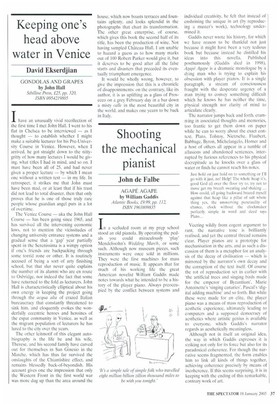Shooting the mechanical pianist
John de Faibe
AGAPE AGAPE by William Gaddis Atlantic Books,19.99, pp. 112. ISBN 1903809835 In a secluded room at my prep school stood an old pianola. By operating the pedals you could miraculously 'play' Mendelssohn's Wedding March, or some such. Although now museum pieces, such instruments were once sold in millions. They were the first machines for mass reproduction of music. It appears that for much of his working life the great American novelist William Gaddis made notes towards what he intended to be a history of the player piano. Always preoccupied by the conflict between systems and
individual creativity, he felt that instead of enshrining the unique in art (by reproducing a master's work), technology undermined it.
Caddis never wrote his history, for which we have reason to be thankful not just because it might have been a very tedious book but because instead he distilled his ideas into this novella. Published posthumously (Gaddis died in 1998), Agape Agape is a dramatic monologue by a dying man who is trying to explain his obsession with player pianos. It is a single paragraph, a stream of consciousness fraught with the desperate urgency of a man trying to convey something difficult which he knows he has neither the time, physical strength nor clarity of mind to articulate clearly.
The narrator jumps back and forth, cramming in associated thoughts and memories, too frantic to get them down on paper while he can to worry about the exact context. Plato, Tolstoy, Nietzsche, Flaubert, Babbage, Byron, Michelangelo, Homer and a host of others all appear in a tumble of allusions and abandoned sentences, interrupted by furious references to his physical decrepitude as he knocks over a glass of water or finds he cannot reach his notes.
Just hold on just hold on to something or go with it just, no! Help! The whole heap it's. good God all over the floor try to, try not to move get my breath sweating and shaking ... How could, all going backward braced myself against that heap like a pillar of salt whole thing yes, the unswerving punctuality of chance, clock without the clockmaker perfectly simple in word and deed says Plato...
Veering wildly from cogent argument to rant, the narrative tone is brilliantly realised, and yet the central thread remains clear. Player pianos are a prototype for mechanisation in the arts, and as such a discussion of them is a metaphor for an analysis of the decay of civilisation — which is mirrored by the narrator's own decay and the corruption of the text itself. Of course the rot of reproduction set in earlier with 'the artificial trees and singing birds made for the emperor of Byzantium', Marie Antoinette's 'singing canaries', Pascal's 'digital adding machine' and so forth. But while these were made for an elite, the player piano was a means of mass reproduction of aesthetic experience, ultimately leading to computers and a supposed democracy of aesthetics where artistic genius is available to everyone, which Gaddis's narrator regards as aesthetically meaningless.
Although not in itself an original idea, the way in which Gaddis expresses it is striking not only for its force but also for its paradoxical coherence. For though the narrative seems fragmented, the form enables him to link all kinds of things together, achieving coherence precisely by means of incoherence. If this seems surprising, it is in keeping with the ending of this remarkable, contrary work of art.


























































 Previous page
Previous page